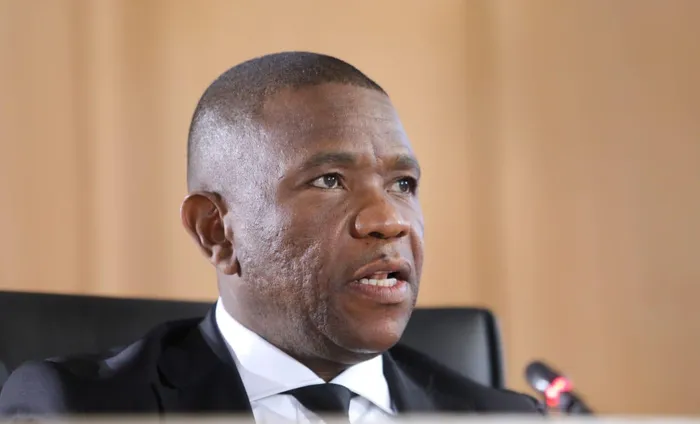Mkhwanazi's shocking revelations on political interference in policing

KwaZulu-Natal Police Commissioner Lieutenant-General Nhlanhla Mkhwanazi is giving evidence at the Madlanga Commission of Inquiry on Friday.
Image: Oupa Mokoena / Independent Newspapers
KwaZulu-Natal Police Commissioner Lieutenant-General Nhlanhla Mkhwanazi has laid bare details of political interference by Police Minister Senzo Mchunu and at least two of his predecessors, Nathi Mthethwa and Bheki Cele.
Mkhwanazi told the judicial commission of inquiry into criminality, political interference, and corruption in the criminal justice system, chaired by retired Constitutional Court Justice Mbuyiseli Madlanga, that political interference was at its worst when he acted as national police commissioner between October 2011 and June 2012.
He said Mthethwa wanted to stop the prosecution of ex-national police crime intelligence head Lieutenant-General Richard Mdluli and stop the disciplinary case against the former top cop.
"If you talk about political interference, that was the worst that I ever experienced. At that time, I came from the specialised operations; the only thing I know is to chase criminals.
"I am promoted to become the acting national commissioner, and I am confronted with this in front of me, and I say, but this is not what I signed up for when I joined the police. This can’t be right," Mkhwanazi explained.
He testified that he felt the then minister could not give him these instructions on how to deal with Mdluli.
"Maybe you brought me to this position and you thought you are going to use me as a pawn, because perhaps of my age or whatever, but you are wrong, I’m not going to do that," Mkhwanazi, who was in his late 30s at the time, recalled telling Mthethwa.
He said he demanded that Mthethwa, now the country's ambassador to France, that if he wanted him to stop charging Mdluli, then he should put it in black and white.
According to Mkhwanazi, Mthethwa then informed late former Inspector-General of Intelligence Advocate Faith Radebe to give him something in writing to stop the investigation into Mdluli.
He also provided more details of Mchunu, who was placed on special leave by President Cyril Ramaphosa in July, interfering in police operations.
Mkhwanazi said he found Mchunu's interference inappropriate and unethical.
Earlier this year, according to Mkhwanazi, following the murder of Mandeni Local Municipality councillor Phendukani Mabhida and the subsequent arrest of two suspects, Mchunu summoned iLembe police district commissioner Major-General Anthony Gopal to brief him about the incident. He said Gopal indicated that the docket had been referred to the political killings task team and that this was standard procedure.
Mchunu wanted Gopal to keep him updated on the investigation and appeared upset instead of being pleased with the arrests, according to Mkhwanazi.
In a separate case, a councillor resigned and campaigned against his former political party during the resultant by-election, Mkhwanazi said, and Mchunu wanted to find out about a case against the candidate who had defected.
However, it later emerged that the case was not against the candidate but his brother.
Mkhwanazi said he interpreted Mchunu's intervention as an attempt to ensure that if there was a case against the candidate, he was going to force the local police station to arrest the candidate so that he did not stand in the by-election.
"This is the type of behaviour we began to see in the province from the executive authority (Mchunu)," he said, adding that Mchunu brought police into a political competition when they are supposed to respect whoever is the leader of the community.
Mkhwanazi also expressed his disappointment with Cele, who he accused of attempting to intervene in the disciplinary hearing of Major-General Feroz Khan, crime intelligence's head of counter-intelligence.
He said Cele approached national crime intelligence head Lieutenant-General Dumisani Khumalo and claimed he wanted him to leave the police to work in Gauteng.
Mkhwanazi said he was surprised because Cele did not like Khumalo, who was formerly Zululand district commissioner.
"He didn’t like him at all, why now that he is out of the police would he want him to work with him in Gauteng?" he asked.
Mkhwanazi said this meant Cele wanted Khumalo to resign from the police, come and work with him in Gauteng for five years, and return to the police.
He said Khumalo, who was temporarily removed from his position in July after being charged with fraud and corruption, just laughed at that and informed him (Mkhwanazi) that Cele wanted him (Khumalo) to back off from Khan’s disciplinary case.
"This is the approach of Cele to get me to back off," Mkhwanazi remembered Khumalo telling him.
"Cele is pursuing Khumalo to resign from the police so that he can stay away from the disciplinary case. That got me so upset that General Cele can really go to the extent of wanting a person to resign from the service because he wants to protect someone?" he testified.
Mkhwanazi said he found this very strange.
"I didn't talk to Cele from that day. I did not talk to him. I was very upset, he disappointed me as a person who is a former minister of police. I was just upset," he added.
Mkhwanazi concluded giving evidence on Friday afternoon, but Justice Madlanga has indicated that he may be asked to return at a later stage.
loyiso.sidimba@inl.co.za